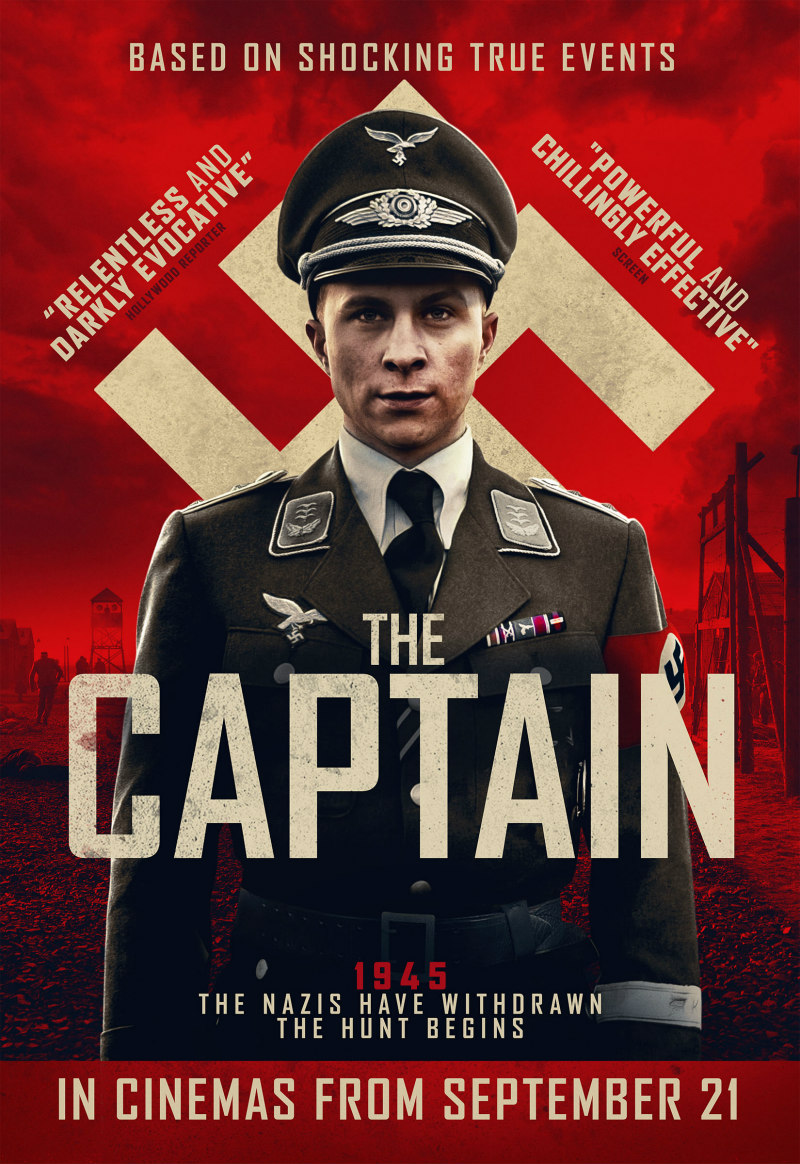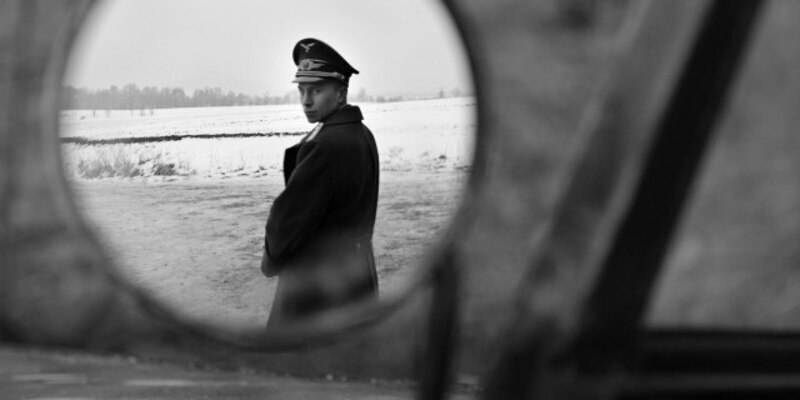
At the end of WWII a German soldier's personality is transformed for the
worse when he dons an officer's discarded uniform.
Review by
Benjamin Poole
Directed by: Robert Schwentke
Starring: Max Hubacher, Milan Peschel, Frederick
Lau, Bernd Hölscher

1945, the penultimate days of an annihilated Nazi Germany. The
Großdeutsches Reich is all but ruined: a gothic landscape with the luxurious
European marrow which we would normally associate with such a descriptor -
warm candlelight, jewels, hidden riches - sucked from the now bare bones of
dead trees, frozen soil and empty skies. Through this dead landscape, a
small man scuttles for his life. In a sequence deliberately framed to invoke
the lazy malice of fox hunting, he is pursued by a baying bunch of Nazis in
a jeep. Shouting "Deserter!", they fire rifles at the poor lad, and you get
the impression that they are near-missing on purpose, all the better to
prolong the enjoyable cruelty of the chase. It’s an indulgence that
ultimately works out for our boy, though (in textbook manipulation, and in
the absence of any other narrative information, of course we identify with
and support this underdog), as the soldier manages to secret himself within
the soil and roots beneath a tree, just as any other frightened animal
would. Disappointed, the mob eventually disappears and Herold (Max Hubacher) is finally alone in the wilderness. But not for long. He happens upon the
abandoned transport of a dead Nazi captain, which holds firearms, food and a
uniform. Before you can say Duke of Sussex, the deserter has donned the
regalia, along with the requisite authoritarian attitude too. Upon wearing
the pilfered clothes, Herold immediately becomes a monster far removed from
the scared rabbit of seconds ago. Turns out that he is a bit like that dog
in The Thing: the hunted will become the hunter. Herold really leans into his role, and
soon he manages to take over a prisoner of war camp full of other deserters,
an institution he administers with extreme prejudice.

Our initial sympathy for Herold and its subsequent wrong-footing is an
ambiguity that makes up the film’s thematic foundations. Is it merely
circumstances which define morality; wherever defining fate has placed
Herold, or anyone else, within the oscillating extremes of a man-made
dystopia? Robert Schwentke’s The Captain is a riveting
accession to German pop-culture’s ongoing struggle to reconcile its horrific
past, yet the universal questions it asks are ones that we can also apply to
today, with the severe concern of right-wing groups gaining traction in
Europe, and the dominance of thoughtless twitter mob-mentality a more
trivial example of the seductive appeal of the perceived consensus. The
natural ease with which Herold adapts to force and violence is mirrored by
his nazi cohorts, who are steadfastly boring thugs to a man. As ever, these
nazis are dull, automatically acting out monotone rhythms of barbarity and
subsequent celebrations, peppered with their shitty, ridiculous little heel
clicks and stiff salutations. The Captain portrays its charges
as empty avatars of mankind’s worst, locked into an utterly senseless yet
compulsive nihilism. Is this what the ruination of a world was for, the film
asks, an unsustainable homeland and unviable infrastructure, with the
‘victors’ getting pissed nightly and mass murdering out of habit, killing
simply to keep the game in play?

Florian Ballhaus’ monochrome cinematography provides a necessary
remove from the brutality; a stand out sequence focusses on the massacre of
prisoners in a trench, which is seen in obfuscating over-the-shoulder frames
from the Nazi perspective; distanced mud and gore spraying the air as
bullets tear the unarmed men apart. At this point in the war, Germany was on
its arse, but yet, as is the wont of all evil, the violence and hatred it
had appropriated was indefatigable, a cumulative dynamic that proved
impossible to stop. When all of the prisoners are finally dead, the officers
get drunk and beat each other up, and when this too loses its appeal for
Herold, he concocts spurious reasons for executing his own officers. Of
course, it is only a matter of time before the bigger boys then catch up
with him, an exhausting, infinite cycle. The harsh key lighting which
Ballhaus utilises to photograph the officers makes memento moris of them
all.

It would be reassuring to think, writing this in perfect freedom with a day
of joyous sybaritism in front of me, that The Captain is a
cynical film, that its themes are redundant on this modern, sunny day and
that people are for the most part inherently good and decent. That no one
would really fall for the Milgram trick. That we can grow and learn. But the
persuasive, sober cadences of The Captain prove difficult to
throw off. Schwentke deliberately confronts any disassociation via a
dizzying real life, gonzo style credit sequence which depicts the cast of
his film in full Nazi get-up wandering modern day Görlitz and giving its
denizens the same sort of bullying shit which their forebearers did just 73
years ago. Some challenge, but most simply acquiesce.

The Captain is on Amazon Prime Video
UK now.
